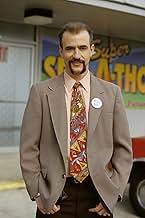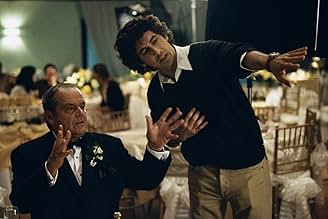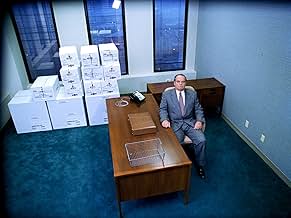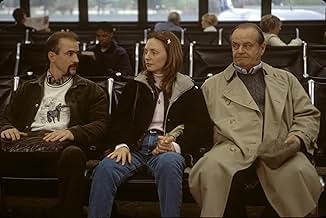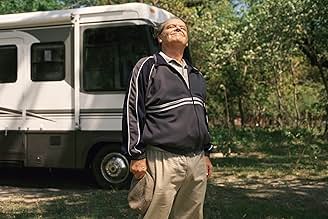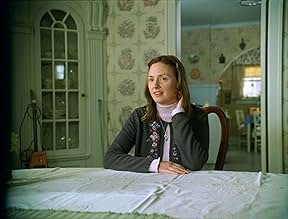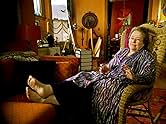Un homme venant de prendre sa retraite entreprend un voyage pour assister au mariage de sa fille qui s'est éloignée. Mais il en apprend sur lui-même et sur la vie plus qu'il ne l'aurait jama... Tout lireUn homme venant de prendre sa retraite entreprend un voyage pour assister au mariage de sa fille qui s'est éloignée. Mais il en apprend sur lui-même et sur la vie plus qu'il ne l'aurait jamais imaginé.Un homme venant de prendre sa retraite entreprend un voyage pour assister au mariage de sa fille qui s'est éloignée. Mais il en apprend sur lui-même et sur la vie plus qu'il ne l'aurait jamais imaginé.
- Réalisation
- Scénario
- Casting principal
- Nommé pour 2 Oscars
- 25 victoires et 71 nominations au total
- Randall's Best Man
- (as James Micheal Connor)
- Neighbor Lady
- (scènes coupées)
Avis à la une
Like Forrest Gump, the film depends on extensive voice over narration, V.O'd by Nicholsen as letters to Schmidt's newly adopted six year old Tanzanian foster child. Through these ridiculous sharings of sextagenarian angst with an African boy, we register Schmidt's internal grievances - thoughts we would never know about otherwise without his commentary. The slow dragging score drains vitality from each transition, as if cinematic momentum would be antithetical to the point of the tale. Back and forth we rock from a single minor chord to a second one, getting nowhere. The mood, the landscape, the buildings, the people say it all: Schmidt's on the road, but he might as well be sitting home in his lay-z-boy. The cushy bucket seat of a 35 foot Winnebago makes a good substitute.
Casting Jack Nicholson may have been the only way this story could have come to the screen. I've racked my brain to think of one other actor who could have pulled Schmidt off. Tony Hopkins? Not with the same comedic finesse. Gene Hackman reprising his role in Coppola's The Conversation or doing his Tennenbaum hamming? Don't think so. Only Jack has the mix. He does some hilarious bits in this, but overall the mood is somber, glum, inert. Can this be how that other famous Warren from Nebransas - Mr. Buffet - lives?
I was confused, amused, depressed and wierdly disoriented by About Schmidt as I left the theater. I commented that it wasn't a film I'd go see again. Thinking about it a day later, I'd hold to that IF it meant returning to the theater and paying. BUT - were I to run across About Schmidt on cable, I doubt I could tear myself away from it any more than I could from a crack up at the Indy 500. And I think that chance encounter might happen more than once, maybe for years. After all, this is the America I know and mark time in myself. A recommended film going experience.
Conflict can often lead to enlightenment and discovery, but not so in the case of Warren Schmidt. In his case it leads to a life of complacency, denial, delusion, and passive-aggressive behaviors... and eventually, to a meaningless life of servitude devoid of passion or purpose.
Since my wife and I are around the same age as the character, and we ponder the same issues of our lives, the film had more significance to us. I found the work to be a cinema-graphic piece of art laced with symbolism and dark humor (at best). I likened it to previous movies like "Death of a Salesman", "The Apartment", "The Swimmer" (Burt Lancaster), or a short filmed called "The Bridge".
As a cautionary tale (or social comment) on the "American Way" of life, the messages it conveys are slightly exaggerated, but nevertheless there to be debated. We are talking about identity, achievement, interpersonal relationships, and the "average IQ".
In the end, I believe this film will become one that is studied in future classrooms, and it was brave of Nicholson to participate in such a character study and a work intended primarily for writers, actors, and directors. If laughter is "the sound we make when we are surprised (or shocked) by the truth", then the amount of humor you find in this film may be directly related to your own level of naivety or denial. After all, laughter can often be just another defense mechanism, right?
Some movies are straightforward, some are magical, some are mystical, and then, some are symbolic. This movie falls into the last category. The use of time, space, cognitive dissonance, and Irony abound in this work and challenge us to look, think, and feel.
Notes: we would have cut or altered the "Percodan scene" at the rehearsal (as overdone), also note- the cattle at the funeral who later appear on the freeway, inside jokes about Des Moines and Denver, Randall's "Certificate of Attendance", the look on Jeannie's face at the end of Warren's speech at the Wedding Reception, the use of "overstatement", details of wall decorations, and Warren's obvious attraction to the trite, idealistic, delusional, and superficial.
If you are a thinking, feeling, serious movie-lover, you should SEE this film once, and then STUDY it the 2nd time!
Such a slice of life-American life with it's many warts-warts that the Americans probably don't even recognize: Winnebagos like moving palaces, freeway monuments to genocide, business that consumes it's workers only to dump them unceremoniously, too much of everything that amounts to emptiness, etc., etc. The novel by Begley, upon which the film was based, illustrated this consumer emptiness brilliantly by the inclusion of the bookends to the film, the sponsorship of the Tanzanian child by Schmidt. The child's material emptiness was contrasted with Schmidt's emotional emptiness in a way America does not recognize much less watch on the screen.
The last part of the movie dealing with the marriage of Schmidt's daughter to a man who came from a diametrically opposite "new age" family was an unstated acknowledgment by his daughter that she wanted nothing of her father's values-she wanted a complete break and she was going to marry the break.
A fascinating, complex movie and I'm sorry I didn't see it much earlier.
In 'Citizen Kane' (1941), the director Orson Welles portrays the same idea when creating Mr. Kane. The movie is more than the story of a tycoon's rise and fall; it is an account of what is ultimately important in a person's life. Even though Kane attains riches and prestige, he is far from happy. He ends with two failed marriages and few friends. At his dying bed, all he has left is his reminiscences - and something called "Rosebud." In 'About Schmidt' the director Alexander Payne uses voiceover to convey Jack's thoughts and memories throughout the movie. To be specific it is when Jack is writing a letter to the boy he sponsors - (Ndugu), at the same time Payne is informing the audience about Jack's regrets and pain concerning his wife and daughter while the movie is still rolling on. I think this is a great technique.I believe this has been a great adventure and wake up call to many Americans as to what is important in life and why we should cherish every moment of it.
Le saviez-vous
- AnecdotesWhen Jack Nicholson received the Golden Globe for Best Actor in a Drama, he commented afterward, "I'm a little surprised. I thought we had made a comedy."
- GaffesAt the wedding, the priest/minister wears the wrong color of vestments: a purple chasuble and blue stole - purple is for Lent and blue is for Advent. The appropriate color for a wedding in terms of church vestments (be it Catholic, Episcopalian or other) is white.
- Citations
Warren Schmidt: Relatively soon, I will die. Maybe in 20 years, maybe tomorrow, it doesn't matter. Once I am dead and everyone who knew me dies too, it will be as though I never existed. What difference has my life made to anyone. None that I can think of. None at all.
- Crédits fousThe film title appears above the New Line Cinema Release credit as end credits are done.
- ConnexionsEdited into Nudes in the News: Show #102 (2005)
- Bandes originalesYou Sexy Thing
Written by Errol Brown and Tony Wilson
Performed by Hot Chocolate
Courtesy of EMI Records Ltd.
Under license from EMI-Capitol Music Special Markets
Meilleurs choix
- How long is About Schmidt?Alimenté par Alexa
Détails
- Date de sortie
- Pays d’origine
- Langue
- Aussi connu sous le nom de
- Mr Schmidt
- Lieux de tournage
- Messiah Lutheran Church, 5015 S. 80th Street, Omaha, Nebraska, États-Unis(Church where the wedding takes place)
- Sociétés de production
- Voir plus de crédits d'entreprise sur IMDbPro
Box-office
- Budget
- 30 000 000 $US (estimé)
- Montant brut aux États-Unis et au Canada
- 65 016 287 $US
- Week-end de sortie aux États-Unis et au Canada
- 282 367 $US
- 15 déc. 2002
- Montant brut mondial
- 105 834 556 $US
- Durée
- 2h 5min(125 min)
- Couleur
- Mixage
- Rapport de forme
- 1.85 : 1


